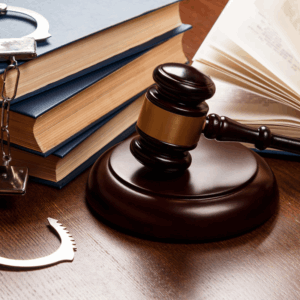
«We will protect your rights and inviolability of your honor and dignity!»
Lawyer
Expert in the field of criminal, administrative and civil law. Specializes in military crimes and crimes in the financial sector
FEATURES OF EXEMPTION OF MINORS FROM CRIMINAL RESPONSIBILITY
 The law provides for two types of release of minors from criminal liability:
The law provides for two types of release of minors from criminal liability:
1. Exemption from criminal liability with the use of compulsory educational measures (Article 97).
2. Exemption from criminal liability in connection with the expiration of the limitation period (Article 106).
Common to these types is that a minor who has committed a crime is, on the grounds provided for in the law, exempted from serving a sentence, from certain restrictions established by the criminal law for that crime.
1. Exemption from criminal liability with the use of compulsory educational measures.
This type is the most important feature of juvenile criminal liability. Part 1 of Art. 97 provides that a minor who first commits a minor offense may be exonerated from criminal liability if his correction is possible without the use of punishment. These measures imply specific measures of influence provided by criminal law, which are not criminal penalties. By their legal nature, these measures are measures of upbringing, persuasion and aimed at ensuring the correct formation of minors, eliminating antisocial properties and skills, preventing them from committing offenses. Obligatory features of these measures are: 1) predictability of their criminal law - Part 2 of Art. 105; 2) their application only by court; 3) applying them only to minors who have committed a crime; 4) the absence of signs of criminal punishment.
1) The reason for release with the use of compulsory educational measures is the possibility of correcting a minor without punishment. The possibility of such correction should be derived from the assessment of the behavior of the minor before and after committing the crime, his attitude to education, work and other circumstances, which testify to the minor danger of the minor. According to Part 2 of Art. 97 compulsory educational measures may be imposed on a person who, before reaching the age of criminal responsibility, committed a socially dangerous act that falls within the scope of the act provided for in the Special Part of this Code.
The necessary conditions for the application of such measures are: a) committing a crime for the first time; b) the crime belongs to the category of crimes of low gravity (Part 2 of Article 12 of the Criminal Code).
2) Part 2 of Article 105 contains an exhaustive list of compulsory educational measures:
a) reservations;
b) limitation of leisure time and establishment of special requirements for the behavior of a minor;
c) transfer of the minor under the supervision of the parents or the persons who replace them, or under the supervision of the pedagogical or labor collective at his / her consent, as well as of individual citizens at their request;
d) laying on a minor who has reached the age of fifteen years and has property, funds or earnings, the obligation of compensation for the caused property losses;
e) referral of the minor to a special educational institution for children and adolescents before its correction, but for a term not exceeding three years. The conditions of stay in these establishments and the procedure for their departure are determined by law.
The caveat is to condemn (condemn) the socially dangerous behavior of a minor, in the demand to stop such behavior under the threat of more stringent liability measures.
Restricting leisure and setting specific requirements for the conduct of a minor may, for example, be prohibited from attending parks, cafes, in the evening, in good faith to attend educational institutions, etc. The duration of these restrictions is determined by the court.
The transfer of a minor to the supervision of parents or persons who replace them, or to the supervision of a pedagogical or labor collective with his or her consent, as well as of individual citizens, at their request, presupposes, in its essence, the control and strengthening of educational influence on the part of those obliged by virtue of family, industrial or other relationships, make a positive impact on a minor. That is why this measure can be applied only when parents or staff have a real opportunity to exert such influence, to create a normal environment for the minor. In paragraph 6 of the Resolution of the Plenum of the Supreme Court of Ukraine of December 22, 1995 "On the Practice of Courts of Coercive Measures of Educational Character", it is recommended that juveniles be supervised by their parents or persons who replace them only if they have information about their ability to provide education. The same requirement applies to the collective or other citizens. It should be borne in mind that the law requires the mandatory consent of the staff to supervise and carry out educational work with a minor, and for citizens - the presence on their part of an appropriate request (paragraph 3 of Part 2 of Article 105). As with leisure restrictions, the duration of the transfer of the minor under the supervision of the staff, parents or other persons is determined by the court, taking into account the particular circumstances of the case.
A more severe form of compulsory educational measures is the imposition on a minor of a duty to compensate for property damage. The law, however, limits its applicability to both the age of a minor and his financial position: this measure can only be applied to minors who are fifteen years of age and have property, assets or income. The most severe of the measures analyzed is the referral of a minor to a special educational institution for children and adolescents. In accordance with the Law of January 24, 1995, "On the Bodies and Services of Minors and Special Institutions for Minors", such institutions are comprehensive social rehabilitation schools for persons between the ages of eleven and fourteen, and vocational schools for social rehabilitation for persons of age from fourteen to eighteen.
As the harshest of all the measures provided for in Part 2 of Art. 105, this measure can be applied only when the minor cannot be corrected by other measures. The term of this measure shall be determined by the court, but may not exceed three years.
According to the Law of January 24, 1995, the main tasks of comprehensive schools and vocational colleges of social rehabilitation are to create appropriate conditions for the life, education and upbringing of students, increase their educational and cultural level, vocational training, development of individual abilities, as well as providing social skills and , their legal education and social protection.
On this basis, the law allows, in exceptional cases, the possibility of holding minors under fifteen years of age in comprehensive schools of social rehabilitation, and up to nineteen years in professional schools of social rehabilitation, if necessary for the completion of the academic year or vocational training.
According to Part 3 of Art. 105, depending on the specific circumstances of the crime and the minor, the court may apply to him several compulsory educational measures at the same time. Along with these activities, part 4 of Art. 105 grants the court the right, if it deems it necessary, to appoint a juvenile guardian.
3) Part 3 of Art. 97 establishes that in the event of the juvenile committing a crime from the use of compulsory educational measures, these measures are annulled by the court and he is criminally liable.
2. Release of minors from criminal liability in connection with the expiration of the limitation period.
Article 106 provides for the peculiarities of the release of minors from criminal liability in connection with the expiry of the limitation period for bringing such liability. According to Part 1 of Art. 106, in order to apply this rule of court, it is necessary, first of all, to take into account the general grounds for applying the institution of limitation of criminal liability provided for in Art. 49 of the Criminal Code (expiration of the statutory terms after the commission of the crime and before the day the sentence enters into force, failure to commit a new crime during these terms, absence of evasion from the investigation or the court).
In the presence of general grounds and conditions for the application of such release, the court must take into account its particular features regarding minors. Such features in accordance with Art. 106 is: first, the possibility of applying it to persons under eighteen years of age before committing a crime, regardless of their age at the time of the release; second, the establishment of a reduced limitation period. Part 2 of Art. 106 provides for such limitation periods;
1) two years - in the case of a crime of slight gravity;
2) five years - in case of committing a crime of moderate gravity;
3) seven years - in the case of a serious crime;
4) ten years - in the case of a particularly serious crime.
Calculate the price of assistance:
1 question
Have other lawyers handled your case?
2 question
Are you in Kyiv or Kyiv region?
3 question
Do you need legal assistance urgently?
Other articles on this topic:
call back
during the day




